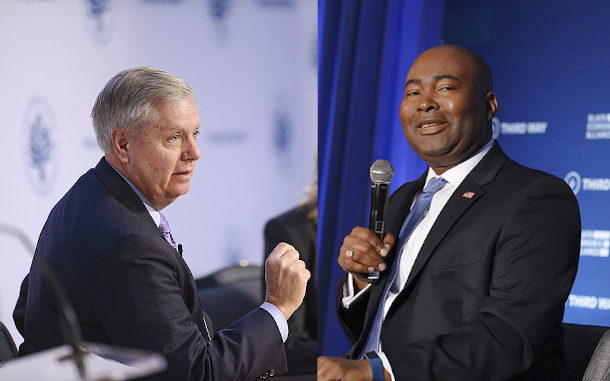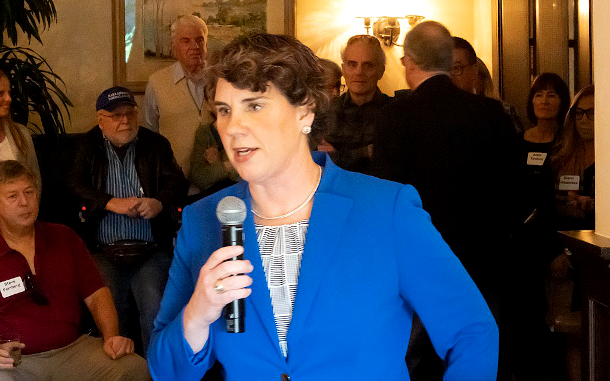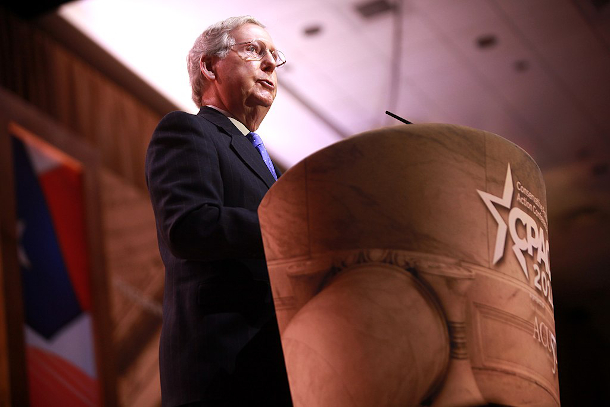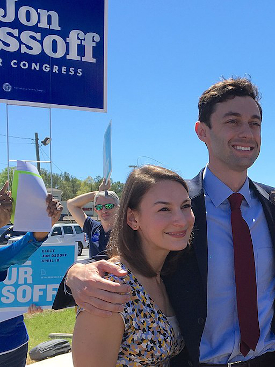Key Southern US Senate Races and the Climate
Air Date: Week of September 25, 2020

Democrat Jaime Harrison, right, is challenging South Carolina Senator Lindsey Graham, who says he supports climate legislation but has done little to advance it. (Photos: U.S. Institute of Peace, Flickr CC and Third Way Think Tank, Flickr CC)
Climate and the environment are controversial subjects in several closely-watched Senate races in the Southern U.S. this fall. The South faces significant climate impacts, and a majority of citizens are concerned, but candidates are taking a low-key approach to the topic. InsideClimate News Reporter James Bruggers joins Living on Earth’s Bobby Bascomb to look at climate politics in four races in Georgia, Alabama, South Carolina, and Kentucky.
Transcript
DOERING: From PRX and the Jennifer and Ted Stanley Studios at the University of Massachusetts Boston, this is Living on Earth, I’m Jenni Doering.
BASCOMB: And I’m Bobby Bascomb.
There are several closely-watched Senate races in the south this fall, in North and South Carolina, Alabama, Kentucky; and Georgia, with 2 seats in play there thanks to a special election. And for all of these races, climate change and the environment are touchy subjects. On the one hand, a majority of residents in each of these states are “worried about global warming”, according to the latest Yale Program on Climate Change Communication data. On the other hand, candidates are fearful of alienating voters with strong language on climate change, and careful to play to the middle on the issue. Reporter James Bruggers lives in Louisville, Kentucky and covers the U.S. Southeast for InsideClimate News. He joins me now to talk about how climate change and the environment are factoring into four of these Senate races. James, welcome to Living on Earth!
BRUGGERS: Thank you.
BASCOMB: Well, let's start with South Carolina, where incumbent Senator Lindsey Graham was once seen as one of the only Republicans who would seriously work on climate legislation. Where does Senator Graham stand now on climate? And how does that compare with his challenger, Democrat Jaime Harrison?
BRUGGERS: Well, they both say similar things. And of course, Senator Graham actually has a record and Jaime Harrison doesn't. So I spent a little more time digging into Senator Graham's record. And the big thing for him is that he was, you know, back in 2010, he played this key role in President Obama losing what was a really good chance of getting some climate legislation through Congress. And he swept in there and was gonna, like, be part, find a solution, find a bipartisan solution. But in the end, he just, I guess he just sort of gave up; he abruptly pulled his support out, citing partisan politics. And there really hasn't been anything in Congress since. Senator Graham, as the election approached, he's been doing some things to try to kind of spruce up his green credentials, and they haven't amounted to anything as it relates to climate change. But there was this, there's a joint House and Senate Roosevelt Conservation Caucus, it's seeking to restore President Roosevelt's environmental legacy. And he and some members of that were supporters of this Great American Outdoors Act, which directs about 10 billion to address National Park Service deferred maintenance backlog. Harrison is running largely on, on his biography. He's a former political operative in the state. He was the first Black head of the South Carolina Democratic Party, he spent some time working in Washington. And the last I saw, the race is pretty close. And so Lindsey Graham is really kind of facing a real steep challenge. And of course, now with him, the big question is going to be Ruth Bader Ginsburg, and what role he plays as head of the Judiciary Committee, and so that probably will overshadow all of this discussion about climate change as well. But, you know, he's, he's got a record of talking a lot about the issue, but not really doing very much.

Amy McGrath is a former Marine fighter pilot who sees climate change as a global security threat. (Photo: Louise Palanker, Wikimedia Commons CC BY-SA 2.0)
BASCOMB: James, now you are from Kentucky, so I'm sure you're very aware of the Senate race there between Mitch McConnell, the Senate Majority Leader, and his challenger, Amy McGrath. How does climate and the environment play into that race, would you say?
BRUGGERS: Well, it's, it's really not playing into it at all as far as I can tell, which may make one ask well, why would we write about the issue? We pay attention to it as journalists, because, you know, whoever's in there is going to be making very important decisions. And Mitch McConnell has a record, well, I mean, he he really sort of dodged the issue for years and years; he would, reporters would ask him, "Do you believe in climate science, do you accept mainstream climate science?" And he would say, "I'm not a scientist". And reporters would come back and say, well, you're not a medical doctor, but you certainly have opinions about the Affordable Care Act or whatever else. But he did, this last year, in response to a question about the Green New Deal -- it was like one of these little gaggles where reporters were chasing him around the Capitol -- and he said he accepts climate science. So that was a first, I hadn't heard that before from him. But he still hasn't offered up a plan. And remember, he's the one who, for eight years referred to President Obama's "war on coal", and of course, Kentucky is a coal state, historically, a coal state, there's not a lot of coal being mined anymore. And there's hardly any miners left, there's still, you know, a few thousand I believe. But that's been his thing, is to defend Kentucky as a coal state.
BASCOMB: And what about his challenger, Amy McGrath, where does she stand on these issues?

Senate Majority Leader Mitch McConnell is the longest-serving Senate Republican leader in U.S. history. He has been a long-time champion of the Kentucky coal business and has often worked against climate protection legislation. (Photo: Gage Skidmore, Wikimedia Commons CC BY-SA 2.0)
BRUGGERS: So it's been pretty hard to get elected in Kentucky to a statewide office without pledging some sort of allegiance to coal. And she's not done that. And that's actually, even though she's considered a moderate candidate, that's a pretty progressive position, just the mere fact that, you know, she hasn't been running around the state pledging allegiance to coal. Her view of climate change comes from her military experience. She's a retired Lieutenant Colonel, Marine Fighter Pilot. She's landed planes on aircraft carriers, she flew in dozens of combat missions over the Middle East. And her view of climate change reflects the view of what the Pentagon would say, that climate change is a national security threat and a global security threat. And so her position, actually, if someone ran for office in Kentucky, you know, like 10 years ago and said that, environmental community here would be pretty excited about it. But they're not; part of the problem is that there was a very popular progressive candidate who kind of came out of nowhere in the race, I say came out of nowhere because Amy McGrath, Lieutenant Colonel Amy McGrath has gotten the support of the National Democratic Party, and has raised tens of millions of dollars. She's actually outraised Mitch McConnell. And this is money flowing in from all over the country. And yet this candidate, this challenger, Charles Booker, a Black state representative from Louisville, who had a really interesting kind of campaign that he titled or called, "From Hood to Holler," and he was tying in a lot of environmental justice issues, in the West End of Louisville, which is a community that's got a lot of chemical plants and other issues, with issues that are up in the Eastern Kentucky "hollers", with environmental justice issues there. And he also supported the Green New Deal. He really rose in the polls, when there was a lot of unrest in Louisville regarding the Breonna Taylor shooting; but he came up short. And so the Democratic activists in the state, Democratic Party, they have Amy McGrath, and she's the candidate, she's still getting a lot of money. And even though she has a reasonably progressive understanding of climate change, there hasn't been as much excitement that I can tell around the climate issue and environmental issues with her as there would have been with this other candidate, Charles Booker.
BASCOMB: Well, independently of whether Mitch McConnell keeps his Senate seat, there's also of course, the question of whether or not he will retain his powerful position as the Senate Majority Leader. What has Majority Leader McConnell meant over these years for climate legislation? And how could a possible shift towards the Democrats, should they regain control of the Senate, change the game for climate legislation going forward, do you think?

Georgia Senator David Perdue praised President Trump for pulling the U.S. out of the Paris Climate Agreement. (Photo: Gage Skidmore, Wikimedia Commons CC BY-SA 2.0)
BRUGGERS: Senator McConnell has kind of been like the defensive coach on a football team, he's like trying to stop the climate ball from getting across the, you know, the end zone. I mean, he's been resistant to really any serious effort to deal with climate change. And one thing that's important to know about Senator McConnell, I mean, the one thing that really matters to him is, is power. He wants to be in the Senate, he wants to retain his position of leadership, he wants the Senate to stay Republican controlled so that he can have as much power as he can get. But if he loses that; if he wins the election, and somehow he's no longer Senate Majority Leader, it would put the Democrats in charge of the agenda of the Senate. And then presumably they can, you know, they get to decide what hearings to have, they get to decide what legislation comes up for a vote and all that. But there's still, you know, there's still this filibuster rule with 60 votes needed to pass any major legislation. And unless the Democrats change that, you know, I'm not sure what, ultimately, a Democratic agenda, whether it's the Green New Deal, or whether it's Biden's plan or something else, I'm not sure what actually gets through Congress, you know, unless they're able to get 60 votes. Just winning Congress won't necessarily be enough.
BASCOMB: Well, let's turn now to Georgia, where a Democrat, Jon Ossoff, is challenging the incumbent Republican Senator David Perdue. What are their records on environment and climate change?
BRUGGERS: Well, okay, so Senator Perdue, who's a former CEO of Dollar General, he generally avoids climate conversations except to praise Trump for exiting the Paris Climate Agreement, for example. And he excoriated the Obama administration's Clean Power Plan, which Trump's administration has, you know, killed. And he also voted against a "sense of the Senate" resolution that climate change is real and caused by people. Ossoff is like a lot of other Democrats in that he's addressing climate change through this lens of jobs, and the coronavirus. He says that Georgia needs to rebuild from the wreckage, as he calls it, caused by the coronavirus pandemic. He's not endorsed the Green New Deal, but he's called for a major infrastructure program that includes clean energy and energy efficiency and also kind of preparing Georgia coastal communities to adapt.

Jon Ossoff is a media executive and investigative journalist who is challenging Republican Senator David Perdue for a Georgia Senate seat. (Photo: modalt, Wikimedia Commons CC BY-SA 2.0)
BASCOMB: Now in Alabama, I understand that Democratic Senator Doug Jones is facing a challenge from a climate skeptic, Tommy Tuberville. What have those two candidates said about climate change and environmental issues?
BRUGGERS: Well, Tommy Tuberville is a football coach, was a football coach, and had a newspaper interview in a rural part of the state of Alabama a little while ago, this was a coal community in Alabama. And, you know, he said at that time, that there's only one person who can change the climate, and that's God. And in a radio interview later, he cited a conspiracy theory that somehow the coronavirus pandemic might be linked to the Green New Deal, some kind of an experiment, you know, in shutting down the economy. And Doug Jones is an interesting guy; you know, Alabama's a pretty conservative state, it's obviously being hit by hurricanes too. So yeah, so they've got, they're recognizing, I think people who live there know that climate change is something that that's happening. His approach is very common, and very, you know, I've spent a lot of my career in places that are kind of in the middle of the country, and, you know, it's a hook and bullet argument. It's a hunting, fishing argument for conservation. And he makes that case, but he also has, on occasion, clearly said that he's very concerned about climate change, and believes that we should do something about it, it's a little hard to kind of figure out exactly what he would do. But it is a race where if you have climate voters in that state, people who are really concerned about it, they'll have a clear choice; which is the same, you know, if you're a climate voter in Georgia, you'll have a clear choice. If you're a climate voter in Kentucky, you'll have a clear choice. If you're a climate voter in South Carolina -- well, it's there, it's a little hard to tell there, because they're, what they say is pretty similar, but you'll have a pretty clear choice, I guess.
BASCOMB: James Bruggers reports on the US Southeast for InsideClimate News. James, thank you so much for taking this time with me today.
BRUGGERS: I appreciate your time as well. Thanks.
Links
Read the InsideClimate News coverage of Key Senate Races in the 2020 election
Living on Earth wants to hear from you!
Living on Earth
62 Calef Highway, Suite 212
Lee, NH 03861
Telephone: 617-287-4121
E-mail: comments@loe.org
Newsletter [Click here]
Donate to Living on Earth!
Living on Earth is an independent media program and relies entirely on contributions from listeners and institutions supporting public service. Please donate now to preserve an independent environmental voice.
NewsletterLiving on Earth offers a weekly delivery of the show's rundown to your mailbox. Sign up for our newsletter today!
 Sailors For The Sea: Be the change you want to sea.
Sailors For The Sea: Be the change you want to sea.
 The Grantham Foundation for the Protection of the Environment: Committed to protecting and improving the health of the global environment.
The Grantham Foundation for the Protection of the Environment: Committed to protecting and improving the health of the global environment.
 Contribute to Living on Earth and receive, as our gift to you, an archival print of one of Mark Seth Lender's extraordinary wildlife photographs. Follow the link to see Mark's current collection of photographs.
Contribute to Living on Earth and receive, as our gift to you, an archival print of one of Mark Seth Lender's extraordinary wildlife photographs. Follow the link to see Mark's current collection of photographs.
 Buy a signed copy of Mark Seth Lender's book Smeagull the Seagull & support Living on Earth
Buy a signed copy of Mark Seth Lender's book Smeagull the Seagull & support Living on Earth

